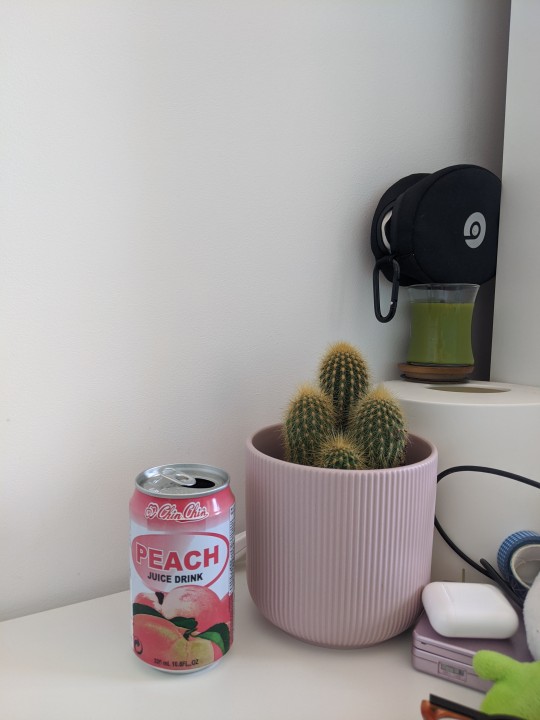Text
Immersive learning whilst you browse with Toucan
I have just downloaded the Toucan Chrome extension to my browser.
Toucan is a freemium application which helps you learn new vocab by replacing words on webpages with vocabulary in your target language that you can then hover over to see the definition. I think there are similar extensions that work like Toucan, but this is the first one that I have tried. I have the free account, and so far I am finding it useful. It certainly leans on the casual side of learning a language by immersion: a few words scattered through a text (at least with the free version), but for revising vocab and learning some new words, it's pretty effective.
For the moment, the app has the following languages available:
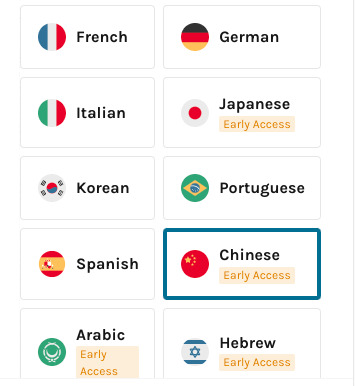

This is the app working on an article to give you an idea of the amount of vocabulary it translates on the free subscription:
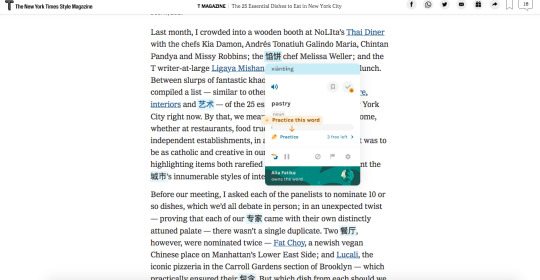
The add-on also stores the words that you have learned on a website so that you can review them or note them down at a later date.
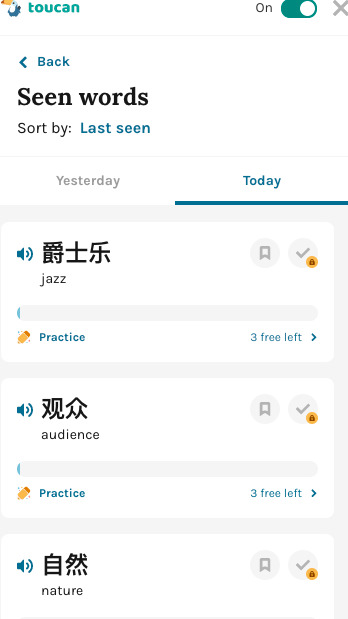
With the free version, you are not able to study them as flashcards in the app, but for the moment, I am happy using it just casually like this. If you have the premium features, you have more immersion in each article. For me at the moment, learning a handful of new words each day suits me perfectly!
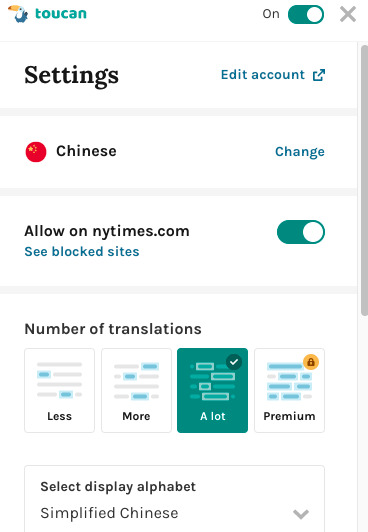

Also, if you want to turn it off at any moment, you have the option to pause the application from automatically translating vocab for you!

The only thing is that you cannot set the difficulty of the words, so if you are advanced in a language, you may find that the words that it translates are a little too easy. I am not sure if in the Premium version you are able to change the difficulty to different language levels, but this is the only thing - it is perhaps best for languages that you dabble in or have a more limited vocabulary in.
72 notes
·
View notes
Text
Happy translator's day!!!
Congratulations to all translators ^^! Your profession is so beautiful. Thanks for you, many people can open their minds into new perspectives, stories and information. Thanks for you we can understand songs, movies, interviews and even school books, novels and the list can go on!!!
Don't let anybody underestimate your carreer, it's useful for daily life because we all comunicate.
38 notes
·
View notes
Text
Happy translator's day!!!
Congratulations to all translators ^^! Your profession is so beautiful. Thanks for you, many people can open their minds into new perspectives, stories and information. Thanks for you we can understand songs, movies, interviews and even school books, novels and the list can go on!!!
Don't let anybody underestimate your carreer, it's useful for daily life because we all comunicate.
38 notes
·
View notes
Text
Un poco de inmersión en la mañana del lunes
Este libro se titula Feminismo para principiantes. Estoy leyendo este libro porque el tema del feminismo me interesa mucho. Así aprendo algunas cosas nuevas, mientras practico mi español al mismo tiempo. También escuché un podcast de duolingo.

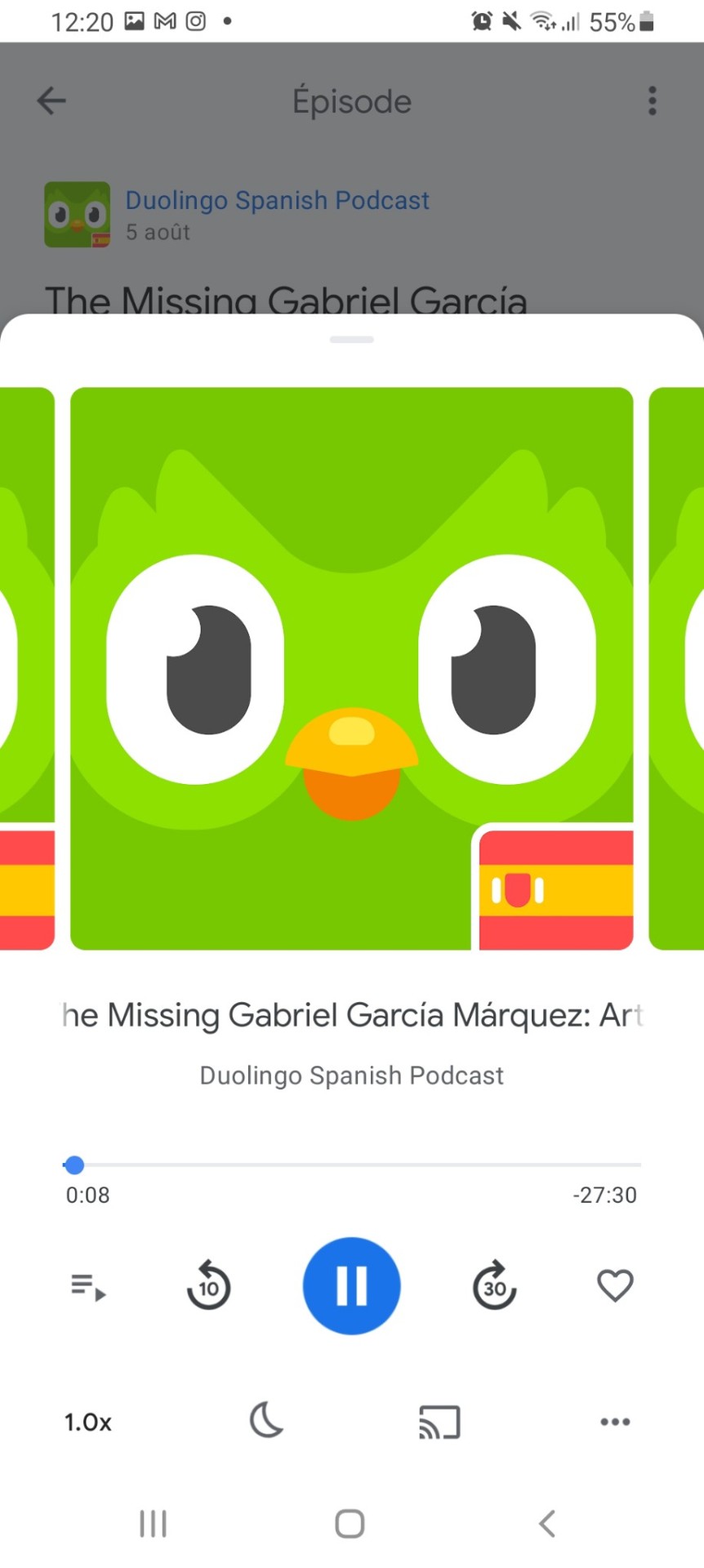
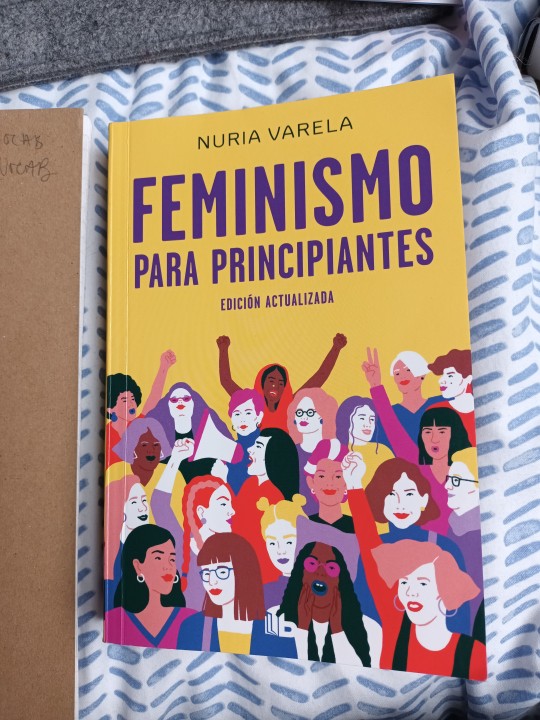
22 notes
·
View notes
Text
GLOSS - Global Language Online Support System
This online resource has tons of resources for lots of different languages, and it is totally free!
There are lots of lessons catered to different levels which tailor vocab practice as well as listening and reading comprehension. I would say that the vocabulary and scenarios are generally more geared up towards security/defence and diplomacy, so if you are studying international relations or something geared towards the international sphere, this may be particularly interesting!
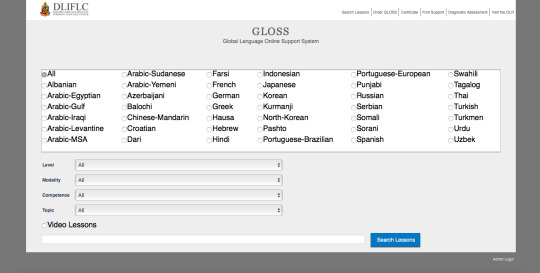

Then you can select different types of activities, which you can download onto your computer as MP3s and PDFs. The activities are categorised based on what skill they train. There are reading and vocab activities that help build up knowledge. Although the topics are pretty specific, they are really useful for getting vocab practice in areas that you are not so familiar with!
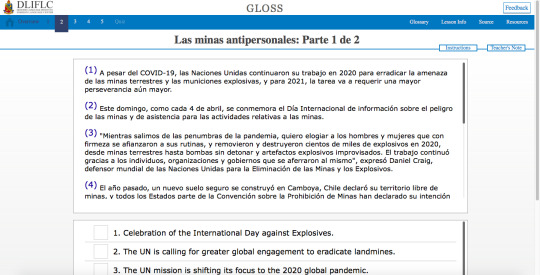
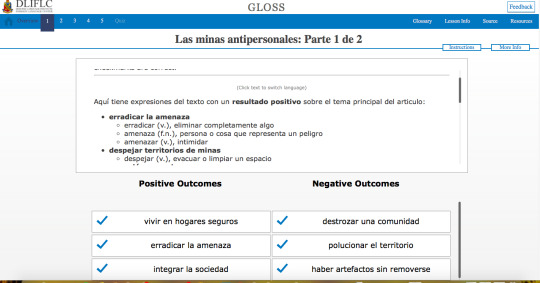
The activities are diverse and varied, with explanations for answers that were not correct!
There is also a glossary for all the new words, which has an audio file to listen to the pronunciation by a native speaker. This is particularly useful for self study, especially when contact with native speakers is less frequent.
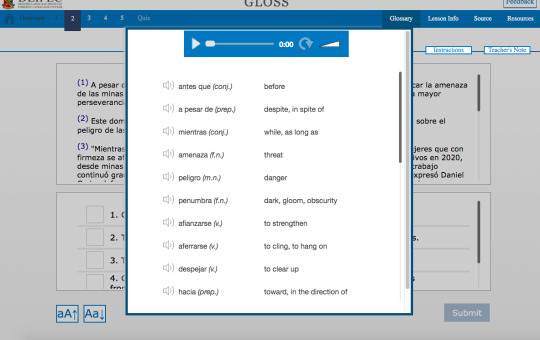
All in all I really rate the website, the resources are a really great compliment to language studies, and although they are kind of 'old school' in their approach, they seem really effective!
***The link***
https://gloss.dliflc.edu/
#langblr#language resources#language learning#language goals#language aquisition#korean language#french langblr#spanish langblr#chinese langblr#mandarin chinese#arabic langblr#vocabulary
925 notes
·
View notes
Text
防御 「防禦」 fang2 yu4 defense, to defend
熙熙攘攘 xi1 xi1 rang3 rang3 bustling with activity
枷锁 「枷鎖」 jia1 suo3 stocks and chain, in fetters
参政 「參政」can1 zheng4 to be involved in politics, participation in politics
参政权 「參政權」 can1 zheng4 quan2 suffrage, voting rights
墨守成规 「墨守成規」 mo4 shou3 cheng2 gui1 hidebound by convention
牢记 「牢記」 lao2 ji4 to keep in mind, to remember
宣誓 xuan1 shi4 to swear an oath (of office), to make a vow
内定 「內定」 nei4 ding4 to decide behind closed doors, to select somebody for a position without announcing the decision until later
资质 「資質」 zi1 zhi4 aptitude, natural endowments
翻唱 fan1 chang4 cover song, to cover a song
妄想 wang4 xiang3 to attempt vainly, a vain attempt, delusion
路障 lu4 zhang4 roadblock, barricade
贬低 「貶低」 bian3 di1 to belittle, to disparage, to play down, to demean, to degrade, to devalue
倾尽 「傾盡」 qing1 jin4 to do all one can, to give all one has
权威 「權威」 quan2 wei1 authority, authoritative, power and prestige
33 notes
·
View notes
Text
Intermediate-advanced podcasts in Chinese
One of the more difficult things in breaking through the intermediate plateau is finding level appropriate listening or reading material: learner material is often too slow, but material for natives is too fast, too advanced and too frustrating. Bridging the gap is difficult to do well - with that in mind, I’ve collated a list of podcasts suitable for intermediate to advanced learners of Chinese. Some of these are designed for learners, some not, but all are grouped by difficulty and accessibility. You can find them all on Spotify.
If you’d like a Chinese-only podcast app, try downloading Ximalaya or 喜马拉雅. It has tons of stuff for learners, university lecture series etc, but is a little more difficult to navigate for intermediate learners. They also have audiobooks, and language series - if you want, you can learn Japanese through Chinese here!
Intermediate podcasts (in Chinese, but easier, slower etc)
1) Li Laoshi’s Chinese Pod - 5 minute podcasts about cultural topics i.e. first emperor of China, invention of paper etc, slow pace with one female host
2) 听故事学中文 - non-adapted stories that are read once in their entirety, then explained in slow Chinese. One female host, good but a bit slow/annoying though you could just listen to the normal speed, non-explained stories.
3) 大鹏说中文 - 5-15 minute episodes, quite slow with a male host with a veeery deep voice, cultural topics, new expressions etc.
4) Learn Something in Chinese with Dee - slow and very calming single male host. Very helpfully gives a percentage indication (50%, 90%) of how much he speaks in Chinese each episode so it’s suitable for all levels of intermediate learners.
Intermediate-advanced (for learners, but at almost natural/faster pace)
1) 聊聊东西 - one of my favourite podcasts ever. Two female hosts who’ve lived abroad talk about cultural differences between China and the west, very natural conversation - quite easy topics/vocab like dating, television, introversion vs extroversion etc but at a very natural speed with colloquialisms, talking over each other etc so really useful. Nothing is really explained but it’s one of my favourites.
2) 自然而然说中文 / Speak Chinese naturally - designed for learners with very clear voice and reasonable speed, but quite advanced vocab. 15 minute episodes with one female host, topics include introducing places, internet vocabulary (!!), language learning etc.
3) Kaela的中文广播 - 15-50 minute episodes with one female host at a reasonable speed, with music in the background, talks about destinations like Shanghai Disneyland, topics like teaching online, feminism, zodiac signs etc.
4) Chinese colloquialised - this could either go in here or above, sometimes advanced vocab but a nice slow speed and clear speech, 5-15 mins with one female host, topics include looking at song lyrics, chengyu, fashion, films, Chinese holidays etc. There are some episodes for the harder ones totally in English, and then another episode (exactly the same) totally in Chinese, so if you get stuck you can listen to the English one but you don’t have to.
5) 面包吐司 - actually this has an American host, but his Chinese is pretty good. He gets in a load of guests and talks about things like giving up smoking, bullying, different dialects, foods from different parts of China. Useful because it’s natural conversation and has guests from different parts of China, as well as quite aspirational! 20-40 mins.
Advanced (not designed for learners, enter at your peril!)
1) 小声喧哗 / Loud Murmurs - this is a GREAT podcast by four American born Chinese women about Western pop culture, especially race, gender, sexuality etc. One of my favourites but very advanced; just four people talking excitedly over each other. Topics include various TV/film reviews such as Black Panther, the Queen’s Gambit etc as well as current shows in China like Street Dance of China. Also feminism, Weinstein, Chernobyl, the list goes on.
2) 迟早更新 - one male host, talks about news, history, culture, technology etc. Not designed for learners but one of the more accessible ones here, as he speaks very clearly and usually there’s only him (and he doesn’t read like he’s reading a book aloud). Episodes around 1 hr, around 200.
3) 返潮流俱乐部 - sometimes one male host, sometimes many. Talks about news, technology, current events. Quite fast but still ok.
4) 硅谷早知道 - two hosts, mostly talking about business and technology, adverts on Facebook, AI, social distance and coronavirus etc. A bit tricky for me, but very interesting!
Other shows that I have on my to-listen list but haven’t yet:
5) 不合时宜
6) 别任性
7) 文化土豆
I like to divide my listening into two categories: active listening, where I try to understand as much as I can, and passive listening, where I am fully aware the content is too advanced and simply let it run in the background. Don’t underestimate the importance of this! You’re teaching your brain to get used to the speed, to get used to different accents and more casual speech - it’s alright if you don’t understand everything. To prevent you from getting frustrated and bored, though, I’d stick to things you understand 80%-90% of the majority of the time, and listen to more difficult language around 20% of the time. Have fun!
加油!
- 梅晨曦
337 notes
·
View notes
Text
防御 「防禦」 fang2 yu4 defense, to defend
熙熙攘攘 xi1 xi1 rang3 rang3 bustling with activity
枷锁 「枷鎖」 jia1 suo3 stocks and chain, in fetters
参政 「參政」can1 zheng4 to be involved in politics, participation in politics
参政权 「參政權」 can1 zheng4 quan2 suffrage, voting rights
墨守成规 「墨守成規」 mo4 shou3 cheng2 gui1 hidebound by convention
牢记 「牢記」 lao2 ji4 to keep in mind, to remember
宣誓 xuan1 shi4 to swear an oath (of office), to make a vow
内定 「內定」 nei4 ding4 to decide behind closed doors, to select somebody for a position without announcing the decision until later
资质 「資質」 zi1 zhi4 aptitude, natural endowments
翻唱 fan1 chang4 cover song, to cover a song
妄想 wang4 xiang3 to attempt vainly, a vain attempt, delusion
路障 lu4 zhang4 roadblock, barricade
贬低 「貶低」 bian3 di1 to belittle, to disparage, to play down, to demean, to degrade, to devalue
倾尽 「傾盡」 qing1 jin4 to do all one can, to give all one has
权威 「權威」 quan2 wei1 authority, authoritative, power and prestige
33 notes
·
View notes
Photo




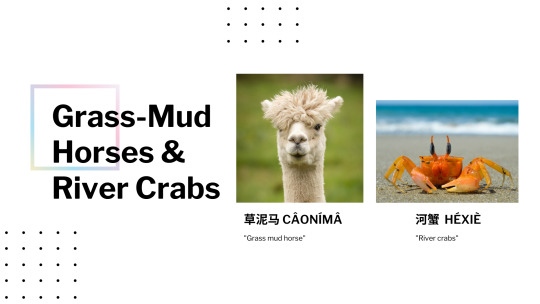
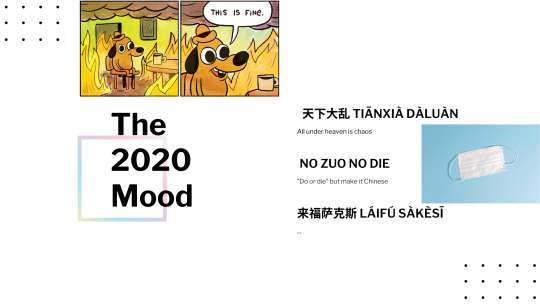
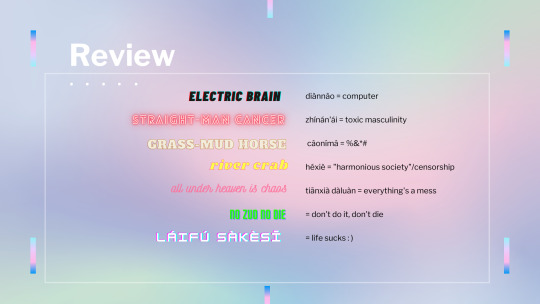

Straight-Man Cancer, Electric Brain, and Other Chinese You Should Know! A ppt that I made for a ppt party (as the trendy tiktok teens like to do I guess). These are just some of the clever neologisms and other phrases in Chinese that I like. Who says Chinese is boring?
Electric Brain is a neologism that means computers. Besides just being a fantastically colorful phrase for such a common object, I I used both traditional (TC) and simplified Chinese (SC) to further demonstrate how Chinese language has adapted over. The TC has the radical for rain, demonstrating a belief that electricity came from rain clouds (ie lightning). The change to SC in this case was seen as part of a movement towards modernization.
On the topic of brains, “brainwash” is a direct translations of Chinese 洗脑 (xînâo), which was used to describe Mao Zedong’s influence over China in the 50s to 70s. 洗脑 follows the pattern of 洗心 (xîxīn), which is used in Taoism to refer to cleaning or purifying one’s heart.
Straight-Man Cancer is a popular phrase used by young people to describe “toxic masculinity” and ideologies which support traditional (hierarchal) gender roles, such as those outlined by 三从四德 (Three Obediences and Four Virtues for women under Confucianism). Straight-Man Cancer can thus be seen as one type of 老思想 (old and outdated ideas/norms).
In China, censorship is a key part of maintaining a “harmonious society” (和谐社会 [héxié shèhuì]). Automated systems will tag key words based on their characters, giving rise to clever work arounds, as seen in the “10 Mythical Animals of Baidu.” The Grass-Mud Horse (câonímâ) is synonymous for another not-so-nice phrase about someone’s mother (if you know, you know), while River Crab (héxiè) is synonymous for the aforementioned “harmonious society” and is used to discuss censorship in general.
And, to make this ppt truly useful, I’ve included some phrases relevant to this terrible, terrible year called 2020. 天下大乱 (tiānxià dàluàn) is a chengyu which basically means “shit’s a mess.” It was apparently used by Mao Zedong to describe the Cultural Revolution. Another chengyu that comes to mind is 满目疮痍 (mânmù chuāngyí) which means “everywhere one looks, a scene of devastation meets the eye.”
“No zuo no die” is Chinglish for “if you act illogically, you will pay the consequences.” In other words, wear a mask folks! Lastly, 来福萨克斯 (láifú sàkèsī) is a wonderful transliteration of “life sucks.” Please see the goddess Jolin Tsai’s song “消极班” for real-life usage.
And to conclude, 加油 (jiāyóu) means “add oil” (keep going!) while 慢走 (mànzôu) means “take it easy.” Lastly, 白面书生 (báimiànshūshēng) )refers to people who read a lot but have no practical understanding of the world (insert gif of “You know nothing, Jon Snow”).
And that’s the wrap! Hope this was maybe a little helpful or interesting, or that at the very least you got to enjoy my *aesthetic* af slides. 拜~~~~
178 notes
·
View notes
Text
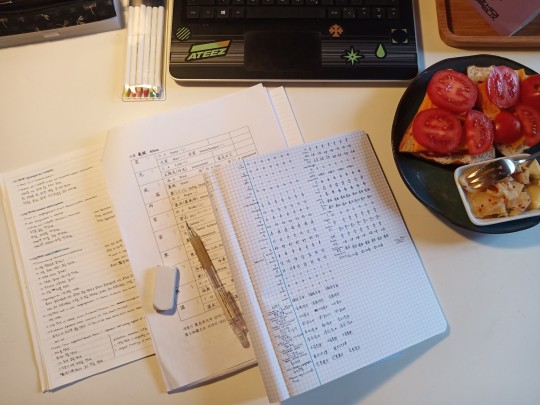

2020/12/16
I am so ready for the holidays. I’m so exhausted, I just want this week to be over already.
I studied a lot of Japanese and Korean today in-between my classes. I also got feedback on my topic proposals for my final paper in my History of Korea class and tomorrow I’ll have a appointment with my professor to talk about it. I really hope it goes well and I can do this project for my paper.
In other news I read more of Rise and Fall of Ancient Egypt (still enjoying it) and I started The Water Dancer by Ta-Nehisi Coates during the weekend. I’m close to finishing it now and it’s so good.
🎶~ Night View by Monsta X
5 notes
·
View notes
Text
(lvl 4) Lesson 3-4
Today we will be doing lesson 3 and lesson 4. In lesson 3 we will learn how to say “it cannot be”, “it is impossible that”. In lesson 4 we will learn about the verb ending 지(요). 시작하자!
Lesson 3
To say “it cannot be”, “it is impossible that” → Verb + (으)ㄹ 리가 없어요
When the verb stem ends in a consonant: 을 리가 없어요
When the verb stem ends in a vowel: ㄹ 리가 없어요
When the verb stem ends in ㄹ: 리가 없어요
Example:
Present: 갈 리가 없어요 = they will never go
Past: 갔을 리가 없어요 = there’s no way they went
Notice: the (으)ㄹ 리가 없어요 got placed after the tense suffix.
Fixed expression
그렇다 = to be so
그럴 리가 없어요 = that is impossible
In this expression, ㅎ is often dropped.
Lesson 4
In level 3 lesson 25, we learned about the verb ending 네(요). In this lesson we will learn about the ending 지(요).
Usage:
You’re talking about something and supposing the other person knows about it.
You and the other person already know it, but you’re just mentioning the fact again.
You and the other person already know it, but you’re reassuring by asking the question
You’re asking yourself to confirm the fact (this is done in 반말)
You’re thinking out loud and asking the people around you (this is also done in 반말)
Tenses:
Present: verb stem + 지(요)
Past: verb stem + 았/었/였 + 지(요)
Future: verb stem + (으)ㄹ 거 + 지(요)
The future is often only used for 3, 4 or 5
Examples:
오늘 날씨 촙지요 = the weather is cold today, right?
맞아요. 피자 정말 마있지요 = right, the pizza is really delicious.
재미있어요? = It’s fun right?
/5 이게 뭐지? = what’s this?
That’s it for today! Good luck studying! Have a nice holidays!!
24 notes
·
View notes
Text
Spanish Language Learning Goals 2021
One of my main goals for 2021 is to improve my Spanish through immersive practices as I will not have the opportunity to take any classes.
Resources I plan on using:
Books:
I am going to try and read more in Spanish, these are the two books that I have in Spanish, and I will try and buy the intermediate version of this short stories in order to progress. I really like these books as they have keywords and questions at the end of the chapter to check your understanding.

This is the second book I have, I have read this in English so it will make it easier to follow. This is more complex, but my goal is to read it and get the general gist, and note down the words that I don’t know to make a glossary. This is probably one that I will read slowly with a lot of post it notes!

Podcasts! : This is my favourite way to learn a language, especially a romance language that is similar to French, as it is relatively easy to follow. I love the Duolingo Spanish podcasts as they are bilingual, so they help you to follow the plot really well, and you can learn about some fascinating stories from across the hispanophone world!
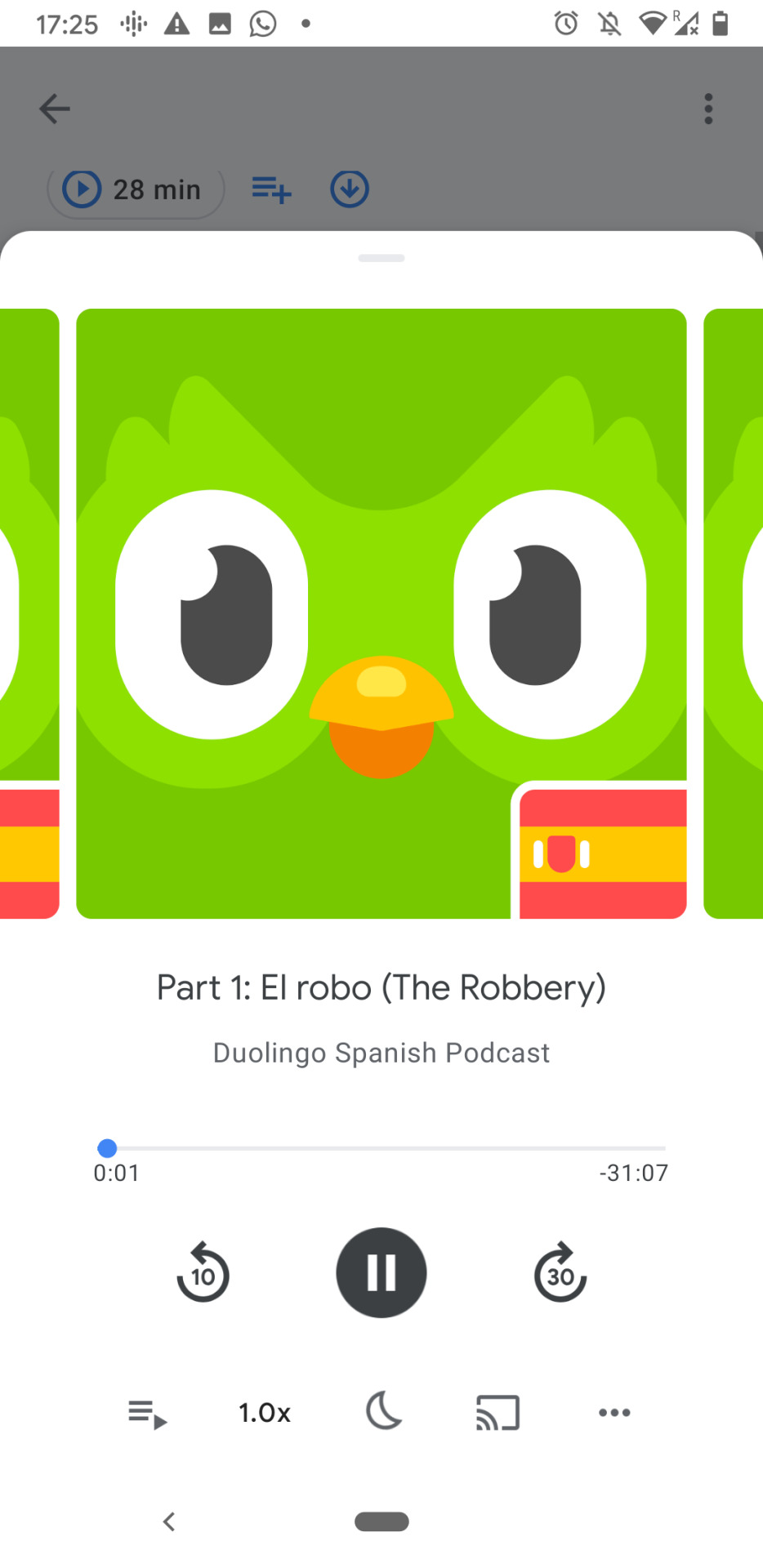
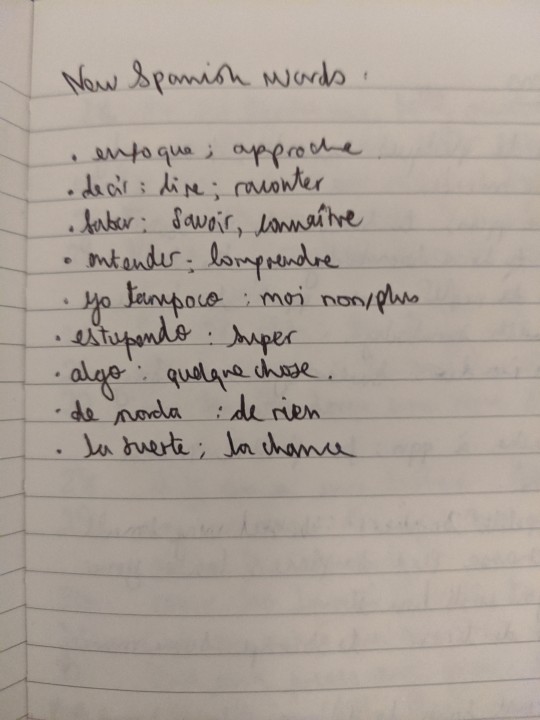
I also have a journal where I can note new words, these are words that I have been learning with the Memrise app, I note the words in my notebook that I don’t know as I go through the levels.
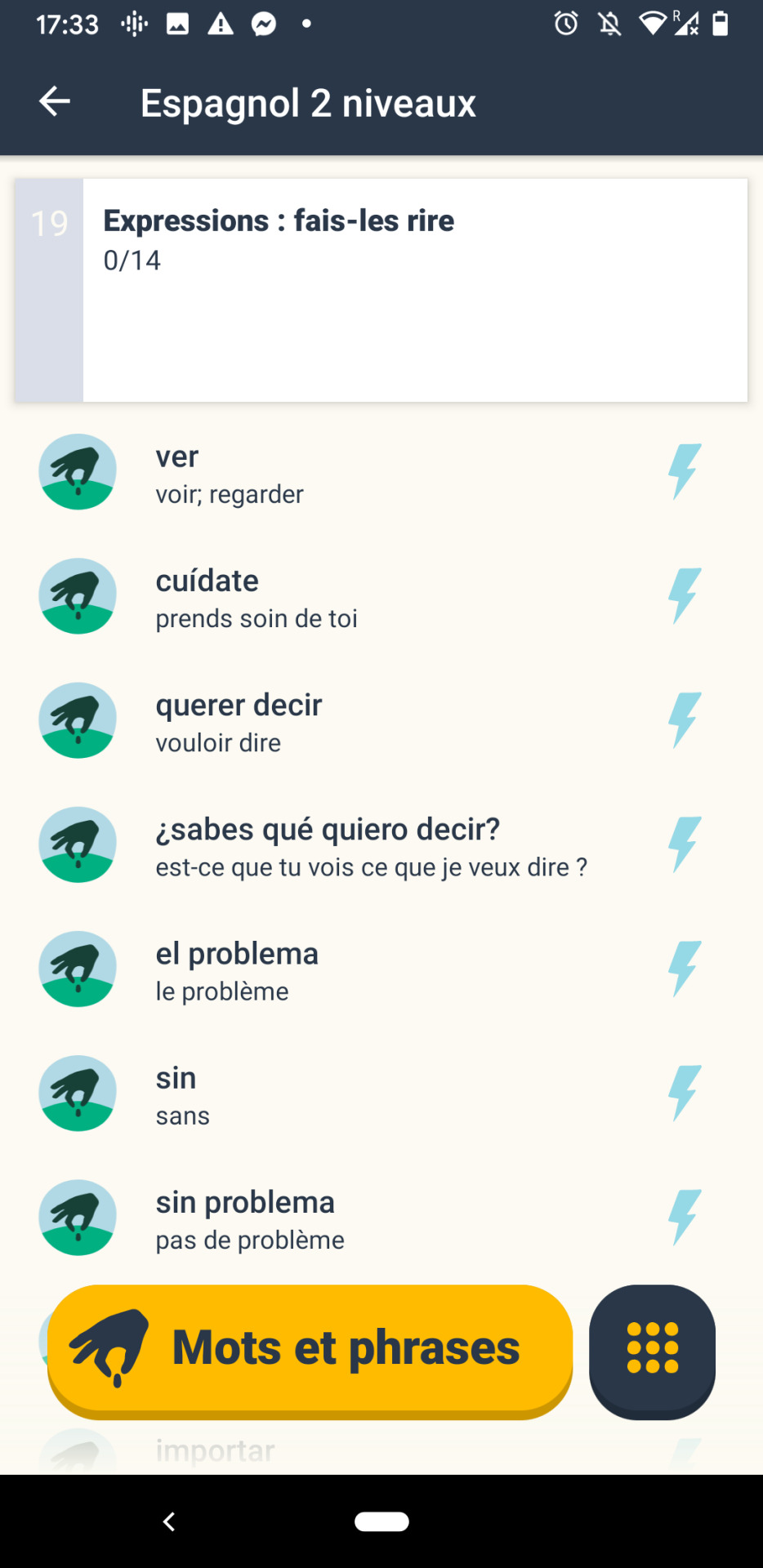
Finally, the New York Times: I got a special subscription for students which is $2 a month which is really cool! It gives you unlimited access to the newspaper, which also has a Spanish edition (and Chinese!) the articles are relatively short, so I think this is going to be really useful for small daily doses of Spanish and to keep up to date with current affairs, with a hispanophone perspective.
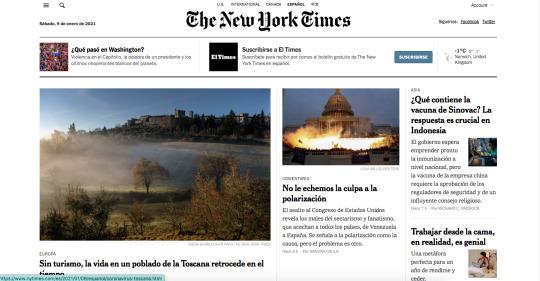
Voilà, these are my main resources that I will try to use this year in order to progress in Spanish.
Espero tener tiempo y esfuerzo para mejorar mucho mi español este año. Quiero pasar de a2 a b2 si es posible, pero sé que esto será difícil!
3 notes
·
View notes







